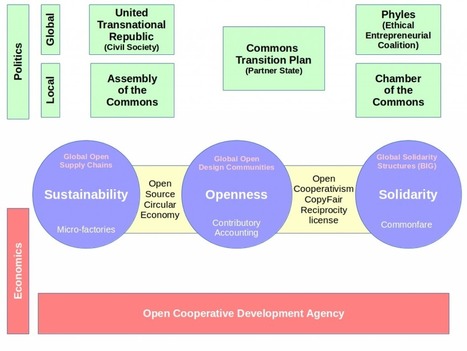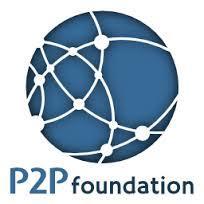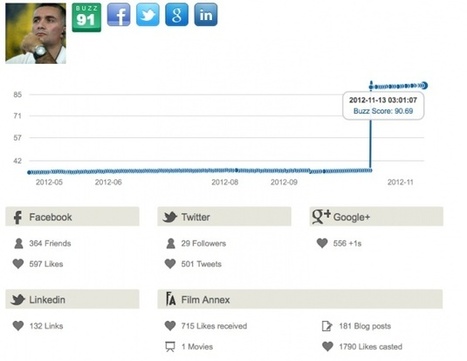 Your new post is loading...
“Both brokering and boundary-spanning roles greatly increase the likelihood of leadership points to the importance of social positions that can unite open innovation communities. We argued that trust does not come easily to community members who fear cooptation by commercial interests or forking over technical disagreements. Because brokers by definition contrive less cohesive and less trusting contexts, the probability that they will assume leadership roles remains highly contingent on building trust with community members. We argue that aspiring leaders can build trust through physical attendance and, consistent with this argument, find a positive interaction with physical attendance. Also consistent with our emphasis on trust in open innovation communities, brokerage and boundary spanning demonstrated a negative interaction, indicating that brokers who span boundaries remain at a disadvantage. While brokerage alone demonstrates positive influence on becoming a leader, boundary spanning demonstrates a much stronger effect. Finally, we did not observe a contingent relationship between boundary spanning and attendance. Our results emphasize the importance of intermediary and integrating roles—for brokers within technological boundaries, and for boundary spanners across cohesive technological boundaries."
Cryptocurrencies (Bitcoin), blockchains, and decentralization) are not just about 1) digitizing and modernizing money, payments, economics, assets, legal contracts, and governance, thereby 2) accelerating the transition to the automation and actualization economy from the labor economy, but 3) more fundamentally, these factors are allowing us to re-explore our reality, and specify it as more internally-determined than externally-determined.
The Centre for Resources, Energy and Environmental Law (CREEL) along with the Open Food Foundation present Commons Governance Masterclass with Michel Bauwens.
The ten commandments of peer production and commons economics For a mode of production and value creation that is free, fair and sustainable! Michel Bauwens, Berlin, October 23, 2015, for the Uncommons conference
Michel Bauwens focuses on three specific realms crucial to a Commons-Based Economy – ecological sustainability, open knowledge and social solidarity.
Ce tableau liste dix briques à prendre en compte pour construire un commun libre, avec pour chaque brique des ressources proposées. Cet outil pourra guider à la réflexion une communauté de contributeurs à un commun ainsi que ses partenaires associés de type public ou privé."
In the gap between people and increasingly unaccountable institutions beholden to financial interests, citizens are rising up to reclaim the commons.
"So if the social consensus is that all verified humans get some percentage of all businesses who use that license then the license now has the teeth of the traditional legal system similar to the GPL."
The ability of humans to organize collective action on a scale much larger than would be predicted by theories of egocentric rationality can be perhaps best explained in an evolutionary context by the slow and uncertain process (not necessarily leading to a desired end) of group selection on cultural variation (distinct from group selection based only on genetic kinship), facilitated by humans' special skills at imitation and teaching.
"I wish to propose that the democratic and potentially practicable dimension of the libertarian goal be expressed as Communalism, a term that, unlike political terms that once stood unequivocally for radical social change, has not been historically sullied by abuse. Even ordinary dictionary definitions of Communalism, I submit, capture to a great degree the vision of a "Commune of communes" that is being lost by current Anglo-American trends that celebrate anarchy variously as "chaos," as a mystical "oneness" with "nature," as self-fulfillment or as "ecstasy," but above all as personalistic.7
Here’s Michel Bauwens in conversation with Álvaro Andoin on the need for P2P. Although the original interview was recorded over a year ago in Michel’s last visit to Spain, it’s still highly relevant and totally cool as culo.
"Rejecting the dichotomy of centralism and horizontalism that has deeply marked millennial politics, Rodrigo Nunes’ close analysis of network systems demonstrates how organising within contemporary social and political movements exists somewhere between – or beyond – the two. Rather than the party or chaos, the one or the multitude, he discovers a ‘bestiary’ of hybrid organisational forms and practices that render such disjunctives false. The resulting picture shows how social and technical networks can and do facilitate strategic action and fluid distributions of power at the same time. It is by developing the strategic potentials that are already immanent to networks, he argues, that contemporary solutions to the question of organisation can be developed."
|
Common resources are best managed by the people who most benefit from them
Last night I had the pleasure of seeing peer-to-peer and commons theorist Michel Bauwens present at the BizDojo on his speaking tour of New Zealand. Having followed his thought leadership for some time, seeing him speak in person provided an immediate impetus towards action, and had me wondering why peer-to-peer models of production haven’t become a dominant force in our current political and market discourse?
http://p2pfoundation.net/Ten_Commandments_of_Peer_Production_and_Commons_Economics Source The ten commandments of peer production and commons economics For a mode of production and value creation that is free, fair and sustainable! Michel Bauwens, Berlin, October 23, 2015, for the Uncommons conference Text “As we have tried to show elsewhere, the emergence of Commons-Oriented Peer Production has generated the emergence of a…
"Workers’ Councils are a Liberatarian Socialist system of organization. Rather than implementing Soviet-style centralized command economies, workers councils are decentralized and democratic. Workers in a particular workplace decide what their objectives are then appoint temporary (and instantly revocable) delegates to be responsible for them. Workplaces appoint representatives to local councils, local councils appoint representatives to regional councils, and so on, always temporarily and revocably. It is a system of face to face socialisation and political representation rather than top-down control.
"Two key insights are, first, that non-state sovereign entrepreneurs (NSEs) already have formed non-territorial sovereign organizations (NSOs) - sometimes in embryonic or hybrid form that share authority with state sovereigns - and, second, that NSOs are neither just non-governmental organizations (NGOs) nor sovereign states. Instead, like states, NSOs are invested with authority and exercise supremacy, but, like NGOs, are without defined territory. A striking commercial example of an NSO providing effective global governance is given by ICANN, the Internet Corporation for Assigned Names and Numbers. A private non-profit public-benefit corporation, ICANN's mission is “to coordinate, at the overall level, the global Internet's systems of unique identifiers and in particular to ensure the stable and secure operation of the Internet's unique identifier systems" (www.icann.org/en/general/bylaws.htm#I). ICANN's scope of activity is global, acting as the ultimate rule making body in designing and assigning Internet domain names, a task that is vital to Internet stability. Governments have no direct decision making powers in ICANN.
Four short videos specifically designed to introduce newcomers to Commons-oriented P2P approaches to politics, economics, fairness and sustainability
This article investigates a form of governance that makes online social production possible. Drawing on the concepts of capability and routine, we develop a dynamic, process-oriented view that departs from past research focused on static comparative analysis. We theorize that online social production systems develop a collective governance capability to steer the process of integrating distributed knowledge resources to the production of value. Governance mechanisms emerge from individual and collective learning that is made possible by new technology, and they evolve over time, as routines are developed to respond to new problems faced by a growing production system. Using Wikipedia as a paradigmatic example of online social production, we characterize governance as an evolving, enabling and embedded process and discuss implications for a dynamic theory of governance.
Peter Waterman: "It runs to only some 50-60 pages on my ebook reader, costs 5 Euros, and is written in a language more or less comprehensible to me, even if I have to struggle to make it so."
"A mathematical formula to evaluate social complexity in sustainable terms Author: Andreu Ginestet In September 2012, Andreu Ginestet published his book PAX, under the pseudonym Andrés Ginestet. This book contains notions on how to approach global complexity governance in a peer-to-peer perspective and in popular terms. The mathematical formula as presented is a one more piece of information com-plementing the book PAX. The same formula is being used to create policies for politics."
"A collection of fifteen essays that explores a new generation of digital technologies that are re-imagining the very foundations of identity, governance, trust and social organization. The fifteen essays of the book stake out the foundations of a new future – a future of open Web standards and data commons, a society of decentralized autonomous organizations, and a world of trustworthy digital currencies and self-organized and expressive communities like Burning Man. A recurrent theme in all of the essays is the huge, untapped potential for self-organized, distributed governance on open platforms.
= "Solidarity cooperatives” are multi-stakeholder coops, bringing togther all parties involved in a particular endeavor―workers, consumers, producers and members of the larger community―in a democratic structure of ownership and control. [1]
|



 Your new post is loading...
Your new post is loading...

















